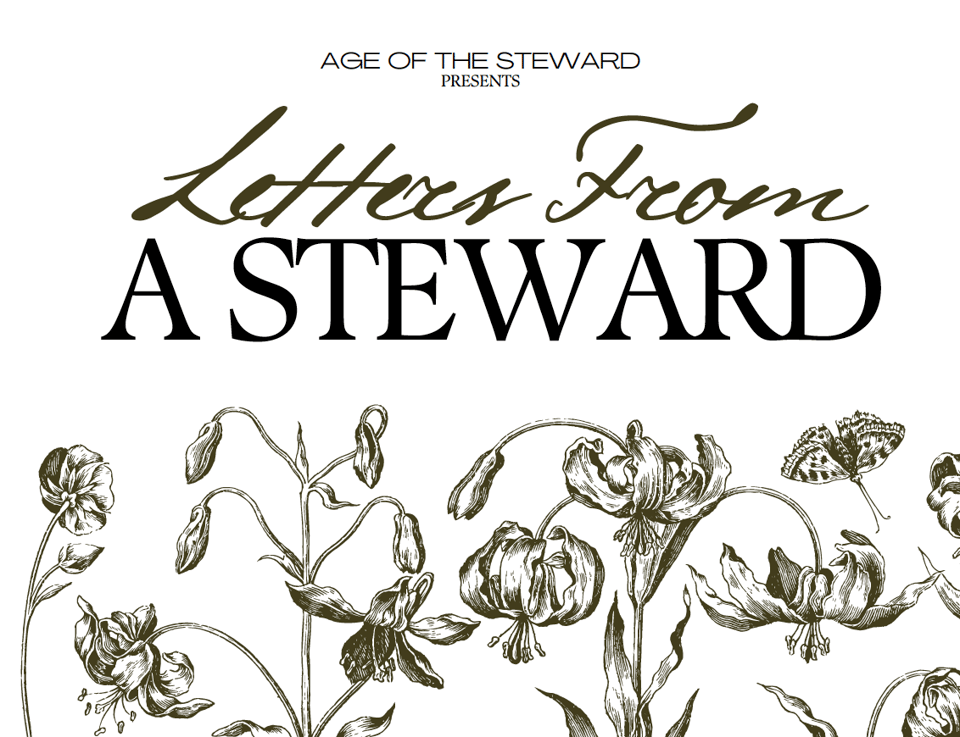Artefact 255
Letter from a Steward, by John V Willshire, for Hardeep Kaur's social moonshot 'Age of the Steward'.

Letter from a Steward
As promised, the full text of my ‘Letter from a Steward’ which I wrote for Hardeep Kaur’s Social Moonshot, Age of the Steward, and read aloud at What Do I Owe The Cosmos on October 29th 2025.
Please feel free to forward to the stewards in your life, or those who you believe may be called to step up.

Dear H
What is it to be a steward? Our recent conversations have tended to meander through this territory.
I offer this letter as extensions of those wanderings; some detours off the main path, some interesting views to stop off at along the way.
I also write with an awareness of the public form it will eventually take, as part of whatever form ‘letters from a steward’ takes.
It is an open letter describing an open space; a theme to which I shall return.
As always, I have found myself snuffling through the etymological undergrowth of a word.
I often use the rather prosaically named etymonline.com. I am particularly aware of the irony in seeking some authoritative perspective on the origin of words from a website which displays such a clear disinterest in language.
Welcome to the 21st century.
In Old English, steward appears to be constructed of two parts. Firstly, sti, meaning ‘hall, pen for cattle, part of a house’. I would guess this goes back to the days where a byre-dwelling would have a space inside for the animals too. Then ward, from the Proto-Germanic wardez, means ‘guard’.
It feels fitting that the word steward came from – and still often means – the ‘guardian of a space’.
Of course, the world has grown around (and sometimes outgrown) the words we have assigned to things. But as I sift through the definitions nestled into different internet cubby-holes, this theme repeats.
Over the centuries, steward has been used to describe roles like; the official in charge of the domestic affairs of a large household; the overseer of the work carried out in a particular place; the person in charge of provisions and meals on a ship or train; the person who supervises arrangements, celebrations, festivities and more.
The steward is still the guardian of these spaces, but never the owner, the boss, or the chief. The steward operates effectively under some higher authority. Those spaces then have always been a mix of the social and the material.
Spaces are things.
As we’ve talked about before, I am a great fan of Bruno Latour’s etymological exploration of the word thing/ding as “complex assemblies of contradictory issues”.
All of the social interactions and material components that are entangled, relational, temporal and complex.
What material might a steward in a given space work with?
It is the objects; the stock of animal feed in the byre, the machines on the factory floor, the restocked food-service supply trolley in a train carriage.
They are the props in the play of life.
Then from the social perspective, it is the interactions around this material. Who is charged with bringing in the feed and making sure the animals eat? Or ensuring safe, effective practice spreads amongst the machinists? Or finding suitable options for passengers with certain food allergies?
A steward is tasked with understanding, and making visible to others, the social and material entanglement of any space.
As new patterns emerge and factors appear within the space, the steward must work out how to incorporate those new elements in ways which enhance that space, or gently edge them out again.
By being able to articulate and demonstrate what this space is, a steward helps create the conditions by which others are invited to care for it.
What does this mean to me, though?
I am perhaps always happy to talk in the general and abstract about things, but if this is a ‘letter from a steward’, it is probably necessary to describe some more specific acts of stewardship of my own.
This makes me hesitate a little. I’m not sure if this is a personal or even cultural thing - who am I to offer lessons in stewardship?
But the simple explorations above make me remember that the steward is never the centre of a space, and certainly not a governing entity.
Therefore, in embracing the steward’s lack of authority, here are some reflections on stewarding that might either prove useful to others, or wholly incidental and ignorable.
All spaces are different; here are some things that work sometimes.
I find myself as a steward of three spaces; Cardstock, a monthly meet-up for people who use cards in their work in some way; The STEPS Collective, a group set up to help people see easy ways to start in developing a regenerative practice of their own; and a Nature Watch group on the local estate where my family lives.
These groups feel very different in tone, ethos, size, intent.
Also, in each group, I am not the steward, but one of a group. Stewarding is better as a collective effort. The benefits of why this is the case should be obvious, but I shall state them anyway, for clarity.
1. The conceptual space is larger.
What one steward perceives the space to be will not be the same as another.
But we now have an overlapping space between two circles. Add another couple of stewards, and there is both an identifiable core for the space, yet more edges which expand into interesting overlaps in topics, approaches, hosting styles and more.
Collective stewarding creates more interesting and expansive spaces.
2. The connectivity is greater.
A group of stewards naturally bring more network effects around a concept.
There are also more doors in to the space, as each guardian creates an entrance point through which others are invited and welcomed. In turn, these others may volunteer to be stewards in the future. Collective stewarding offers a diversity in which new things can grow.
3. The administrative load is lighter.
Many hands make a space work more regularly.
This will often be the very mundane things; setting up invites, arranging logistics, provision of technology, and so on.
But the steward’s role was ever thus!
It is the domestic care for a space, this regular drudgery, that helps it function for those who enter. Collective stewarding makes it easier to set out the chairs beforehand and clean the tables afterwards.
(I can think of other benefits too, but these are the three that grab me initially.)
To finish, then;
Stewarding, as a collective guardianship of a space, provides an invitation to care for anyone who enters.
It helps people become entangled in their own way with the major and minor matters of concern of that space, in all of the differing and delightful social and material dimensions.
I think I’m saying that stewarding is a thing.
Yours in stewardship
John V Willshire